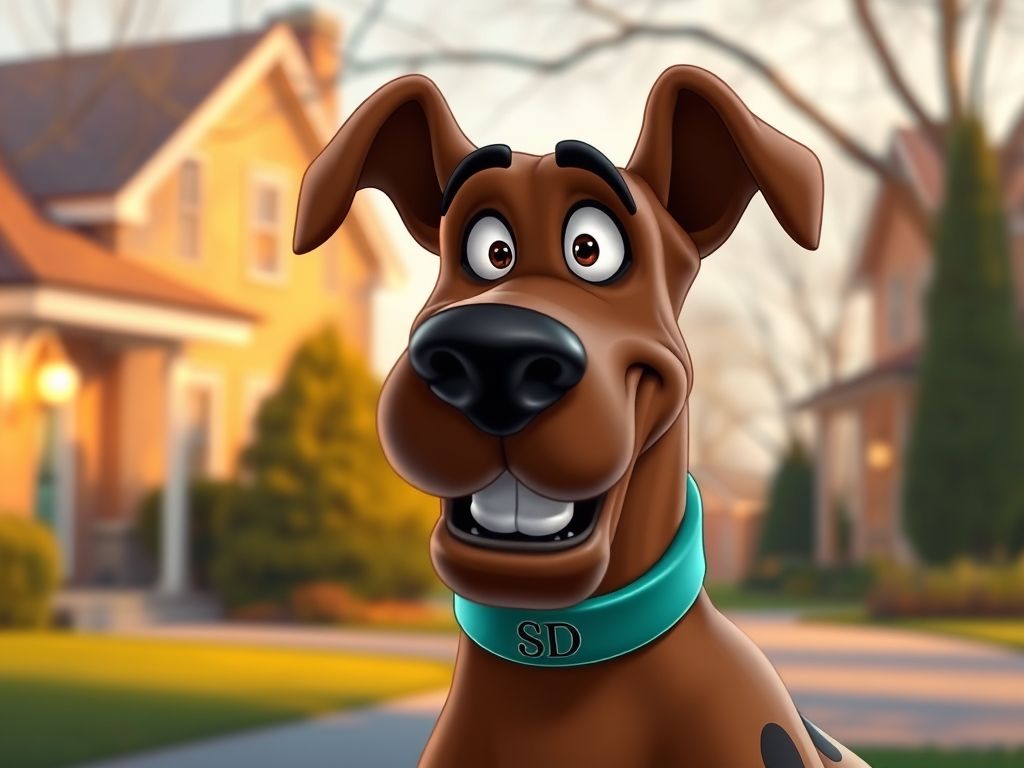Scooby-Doo Basic Information

Scooby-Doo's iconic look that made him famous
Scooby-Doo
💭Cartoon Chat with Scooby-DooCreation Info
First Appearance
September 13, 1969 ('Scooby-Doo, Where Are You!' TV series premiere)
Creator
Joe Ruby, Ken Spears (concept/writing); Iwao Takamoto (character design)
Series
Scooby-Doo (Franchise)
Copyright
Hanna-Barbera Productions / Warner Bros. Animation
Identity
Species
Dog (Great Dane)
Gender
Male
Age
7 (in dog years, often cited)
Birthday
September 13 (based on premiere date)
Occupation
Mystery Solver (Member of Mystery Inc.), Professional Eater
Scooby-Doo's Appearance
Physical Features
Height
Tall for a dog
Body Type
Lanky Great Dane, sometimes walks bipedally
Color Scheme
Brown fur with distinct black spots on his back, black nose.
Signature Style
Outfit
Blue collar with a yellow, diamond-shaped tag engraved with 'SD'.
Catchphrase
'Scooby-Dooby-Doo!''Ruh-roh!'
Accessories
Collar and tag
Scooby-Doo Character Background
Origin Story
Created by Hanna-Barbera writers Joe Ruby and Ken Spears, and designed by Iwao Takamoto, Scooby-Doo was conceived as part of a less violent Saturday morning cartoon in response to parental complaints about action cartoons in the late 1960s. He became the talking Great Dane companion to a group of mystery-solving teenagers.
Character Timeline
TV Debut
Scooby-Doo, Where Are You! premieres on CBS, launching the franchise.
Numerous Series & Films
Scooby-Doo has starred in countless animated series, direct-to-video films, TV specials, and live-action movies, becoming an enduring animation icon.
Scooby-Doo's Personality
Personality Traits
- Cowardly / Easily Frightened
- Perpetually Hungry
- Extremely Loyal (especially to Shaggy)
- Good-natured and Friendly
- Goofy and Fun-loving
- Capable of great bravery (often motivated by friendship or Scooby Snacks)
- Speaks with a distinct speech impediment (rhotacization)
Strengths
- Loyalty to friends
- Occasional bravery
- Strong sense of smell (sometimes)
- Can run very fast (when scared)
- Lovable personality
Weaknesses
- Extreme cowardice
- Gluttony / Easily bribed with food
- Clumsy
Goals
- To eat food (especially Scooby Snacks)
- To avoid danger/ghosts
- To stay close to Shaggy
- To help solve the mystery (eventually)
Fears
- Ghosts, monsters, ghouls (real or fake)
- Spooky places
- Generally anything scary
Scooby-Doo's Gallery
Scooby-Doo's Abilities
Special Powers
- Ability to speak (though with a distinct impediment)
- Semi-anthropomorphic behavior (can walk on two legs, use paws like hands)
Skills
- Keen sense of smell (variable)
- Impressive speed and agility (when fleeing danger)
- Solving mysteries (often accidentally or with Shaggy)
- Eating large quantities of food
Scooby-Doo's Relationships
Family Members
Scooby-Doo Awards & Recognition
- The Scooby-Doo franchise has received recognition over decades, including Daytime Emmy nominations.
Scooby-Doo Cultural Influence
Pop Culture Impact
Scooby-Doo is one of the most iconic and longest-running animated franchises globally. The characters, catchphrases ('Scooby Snacks', 'Ruh-roh', 'Meddling kids'), and mystery-solving formula are deeply ingrained in popular culture.
Social Impact
The show introduced generations to mystery and light horror themes in a kid-friendly format. It emphasized teamwork and the idea that monsters are usually just humans in disguise, promoting rational explanations over superstition (most of the time).
Scooby-Doo's Theme Colors
More About Scooby-Doo
Scooby Snacks!
These biscuit-like dog treats are Scooby's (and Shaggy's) ultimate motivation. They can often be persuaded to overcome their fear and act as bait or brave danger for the promise of a delicious Scooby Snack.
Ruh-Roh! Speech Pattern
Scooby speaks with a unique impediment known as rhotacization, where he replaces the initial consonant sounds of many words with an 'R' sound (e.g., 'Shaggy' becomes 'Raggy', 'Uh-oh' becomes 'Ruh-roh'). This, combined with his goofy laugh, is instantly recognizable.
Scooby-Doo In Their Own Words
Character Introduction
Ruh-roh! It's Scooby-Doo! This lovable, talking Great Dane is the star of the iconic Hanna-Barbera franchise. Alongside his best pal Shaggy and the rest of Mystery Inc. – Fred, Daphne, and Velma – Scooby travels in the Mystery Machine, solving spooky mysteries and unmasking 'ghosts' and 'monsters'.
Personality Traits
Scooby is famous for two things: his enormous appetite and his tendency to be easily frightened! He and Shaggy share a love for food (especially Scooby Snacks!) and a dislike for anything scary. Despite his cowardice, Scooby is incredibly loyal and loving towards his friends and will often find surprising bravery when they are in danger (or when a Scooby Snack is offered!).
Classic Stories
From haunted houses to creepy castles and spooky swamps, Scooby and the gang face all sorts of seemingly supernatural foes. Typically, Scooby and Shaggy act as reluctant bait, Fred devises a trap, Velma finds the crucial clues, and Daphne... well, Daphne sometimes gets into trouble! In the end, the monster is always unmasked, proving there was a logical explanation all along.
Cultural Impact
"Scooby-Dooby-Doo!" With decades of television shows, movies, and merchandise, Scooby-Doo is a true pop culture phenomenon. His goofy charm, iconic catchphrases, and the enduring appeal of the mystery-solving format have made him beloved by generations of fans worldwide.